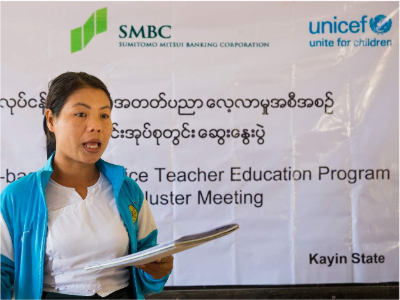Cover image: © UNICEF/UN0406614/Htet
Humanitarian advocacy is a strategic and evidence-based process aiming to influence policies, practices and behaviours of local, national, regional and international stakeholders in a continuous manner to address vulnerabilities in emergencies as well as before and after crisis and in situations of protracted vulnerability, suffering or conflict, ensuring the human rights of the affected population are protected.
Learning objectives
By the end of this module, you will be able to:
- Explain what advocacy is and identify the different types of advocacy
- Identify issues for cluster advocacy
- Explore the characteristics of humanitarian advocacy and its potential risks and mitigations
- Understand the link between humanitarian principles and humanitarian advocacy
- Apply a human rights-based approach to advocacy in humanitarian settings
Audience
This module is an introductory-level course aimed at anyone who is interested in developing skills and knowledge in nutrition cluster coordination in humanitarian contexts, and who needs to engage with humanitarian architecture on this topic. It is part of the recommended learning path for sub-national nutrition cluster coordinators aiming to progress to national-level roles.
Length
It should take you about 50 minutes to complete this self-paced course.
Methodology
This course is composed of a single short self-paced animated module, including various examples and activities.
Structure
Introduction
Lesson 1: What is advocacy?
15 mins
Lesson 2: Humanitarian advocacy
15 mins
Lesson 3: Humanitarian principles and humanitarian advocacy
10 mins
Lesson 4: Human rights and humanitarian action
8 mins
Summary
Contact details
For technical issues, you can contact https://www.nutritioncluster.net/Ask_question
